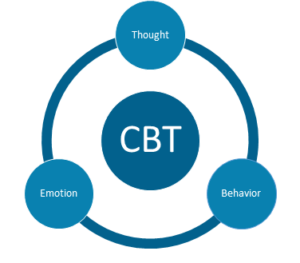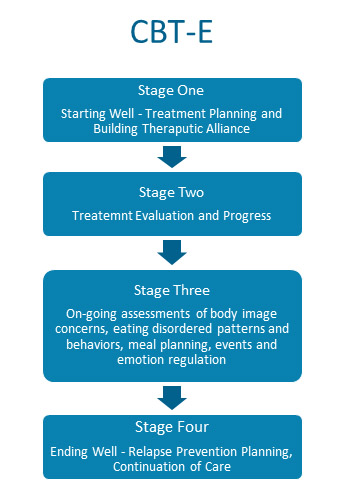Our Treatments
EDCare believes in providing only the best in eating disorder treatment. As an evidenced-based treatment program, our multidisciplinary team utilizes the following treatment modalities to help individuals achieve eating disorder recovery.
Click a location below for a free clinical assessment.
Cognitive Behavioral Therapy (CBT)
CBT is a form of psychotherapy that helps patients challenge the dysfunctional emotions, behaviors, and thoughts maintaining their eating disorder. It emphasizes what is going on in an individual’s current life, rather than what has led to the development of their eating disorder. CBT helps patients recognize, understand and change negative thinking and behavioral patterns.

Cognitive Behavioral Therapy – Enhanced
(CBT-E)
Enhanced Cognitive Behavioral Therapy is a very personalized form of transdiagnostic psychotherapy. Since the symptoms of eating disorders tend to overlap, this method can be used to treat virtually any eating disorder. CBT-E aims to identify the processes maintaining an individuals eating disorder (ie: body image issues, the need to be “in control”, perfectionism, etc.). Every individual will have their own unique set of processes fueling their eating disorder. By identifying these processes, patients learn to recognize disordered thinking and can work to normalize their eating behaviors. CBT-E treatment generally has four stages spanning over a set length of time.

Interpersonal Psychotherapy (IPT)
IPT is a type of therapy designed to help individuals evaluate and improve their interpersonal relationships. This therapy suggests we develop psychological symptoms in response to difficulties in our interpersonal relationships. In other words, how we relate to others impacts our mental health.
–
–
IPT focuses on resolving 4 main interpersonal relationship interactions.
• Unresolved grief and loss
• Role disputes
• Role transitions
•Interpersonal deficits
Dialectical Behavior Therapy (DBT)
DBT is a type of cognitive behavioral therapy originally developed to treat borderline personality disorder. It is now used to treat other mental health issues including anorexia, bulimia, and binge eating disorder. ‘Dialectical’ refers to the integration of opposites; the balance between acceptance and change. DBT helps patients develop new skills and strategies to reduce anxiety, regulate emotions, build self-esteem, control disordered eating behaviors and ultimately allows the individual to become more self-sufficient.
DBT helps individuals connect with their authentic-selves through four modules:
1. Mindfulness
2. Interpersonal Effectiveness
3. Distress Tolerance
4. Emotion Regulation
Acceptance and Commitment Therapy (ACT)
ACT looks at how the human brain works in producing our thoughts. When we understand the basic functions and processes of our brain we can begin to understand our reactions. In eating disorder treatment, ACT teaches mindfulness skills to help patients change their actions, rather than their thoughts and feelings. By identifying core values and shaping goals that work to fulfill those values, patients learn to remain connected to the present and ultimately their authentic selves. It teaches individuals how to deal with their emotions, both good and bad and take positive action.
–
–
A – Accept your thoughts and feelings, be present
C – Choose a valued direction
T – Take action
The Six Core Processes of ACT
1. Being Present
2. Diffusion
3. Acceptance
4. Self-as-context (pure awareness)
5. Values
6. Committed Action
